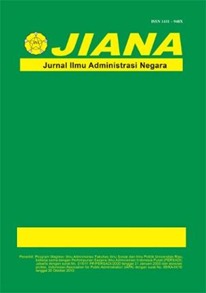INNOVATION ROLE IN PUBLIC SERVICE EFFECTIVENESS: EVIDENCE FROM INDONESIAN STATE ELECTRICITY COMPANY
DOI:
https://doi.org/10.46730/jiana.v22i3.8255Abstract
Digital transformation in the public sector has emerged as a global strategic imperative, compelling government organizations to implement innovation to enhance service effectiveness. However, a significant gap exists in the literature regarding the implementation of innovation in developing countries, particularly within the context of strategic public service organizations that face unique challenges in digitalization processes. This study aims to comprehensively analyze the role of technological and non-technological innovation in enhancing public service effectiveness, identify implementation challenges and solution strategies, evaluate public communication strategies, and assess the impact of innovation on service process acceleration and public satisfaction. The research employs a qualitative design with an instrumental case study approach at PT. PLN (Persero) Belanti Customer Service Unit, located in Padang City, employed in-depth interviews, participatory observation, and documentation and analyzed them through a six-phase thematic analysis framework. Findings reveal that implementing a hybrid model, which integrates digital technological innovation with non-technological approaches, has generated significant transformation in service effectiveness through comprehensive digitalization, multi-channel communication strategies, local stakeholder collaboration, and the institutionalization of a continuous innovation culture. This research contributes theoretically by providing a conceptual framework for implementing public service innovation and offering strategic recommendations adaptable for similar organizations in Indonesia and other developing countries, aiming to optimize sustainable digital transformation.
Downloads
Published
How to Cite
Issue
Section
License

This work is licensed under a Creative Commons Attribution-NonCommercial-ShareAlike 4.0 International License.
The copyright of the received article shall be assigned to the journal as the publisher of the journal. The intended copyright includes the right to publish the article in various forms (including reprints). The journal maintains the publishing rights to the published articles.
Authors are permitted to disseminate published articles by sharing the link/DOI of the article at the journal. Authors are allowed to use their articles for any legal purposes deemed necessary without written permission from the journal with an acknowledgment of initial publication to this journal.

Jurnal Ilmu Administrasi Publik is licensed under a Creative Commons Attribution-NonCommercial-ShareAlike 4.0 International License.




